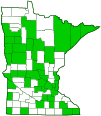common sowthistle
(Sonchus oleraceus)
Conservation • Wetland • Description • Habitat • Ecology • Use • Distribution • Taxonomy
Description |
||
Common sowthistle is a 4″ to 80″ tall, erect, annual forb that rises on one or more stems from a short taproot. The stems are erect, hollow between the nodes, hairless at least below the inflorescence, and usually somewhat covered with a whitish, waxy bloom (glaucous). They occasionally branch near the top. The base of the stem may be soft or hard but is never woody. When broken the stems exude a milky sap. Middle stem leaves are alternate, soft, spatula-shaped, oblong to inversely egg-shaped, or lance-shaped, 2⅜″ to 13¾″ long, and ⅜″ to 6″ wide. They are deeply, irregularly lobed (pinnatifid). At the base of the leaf blade is a pair of ear-like projections (auricles) that wrap around no more than half of the stem. The auricles are triangular to lance-shaped and usually sharply pointed, sometimes rounded. The upper surface of the leaf blade is hairless and dull, not shiny. The lower surface is hairless and usually glaucous. The margins have sharp, spreading teeth with prickles at the tip. Basal and lower stem leaves are similar and are on winged leaf stalks. Upper leaves become gradually smaller, less lobed or unlobed, and have more prominent auricles. The inflorescence is a small cluster of several flower heads at the end of the stem. The stalks of the inflorescence are sometimes hairless, usually sparsely covered with reddish-brown, spreading, glandular hairs. They sometimes have minute, cobwebby or wooly hairs toward the tip (just under the flower head). The flower heads are ⅝″ to 1″ in diameter when fully open. The whorl of bracts at the base of the flower head (involucre) is ⅜″ to ½″ long and either contracted at the tip (bell-shaped) or not contracted at the tip (pitcher-shaped). The bracts of the involucre usually have a few reddish-brown, spreading, glandular hairs, and sometimes have minute, cobwebby or wooly hairs toward the base. Each flower head has 80 to 250 yellow ray florets and no disk florets. The ray florets are 5 ⁄16″ to ⅝″ long and have 5 small teeth at the tip. The flat, spreading, strap-like portion at the end of the ray floret is about the same length as the tube portion at the base. The fruit is a ⅛″ long achene with 3 or 5 faint or prominent ribs on each face and a wrinkled surface. There is a tuft of microscopically barbed hairs at the tip. |
||
Height |
||
4″ to 80″ |
||
Flower Color |
||
Yellow |
||
Similar Species |
||
Perennial sow thistle (Sonchus arvensis) stem is always hard and sometimes woody at the base. The leaf auricles may be rounded or pointed. The flower heads are larger, 1″ to 1¾″ in diameter. The involucre is longer, 9 ⁄16″ to ⅞″ long. The ray florets are longer, ⅜″ to 1″ long. The achene is prominently 5 to 8 ribbed. Prickly lettuce (Lactuca serriola) leaves have a row of prickles along the midvein on the underside. Prickly sow thistle (Sonchus asper) stem is always soft at the base. The leaf auricles are always rounded, never pointed, and often wrap around more than half of the stem. The upper surface of the leaf blade is shiny. The achene is prominently 3 ribbed and is not wrinkled. Thistle (Cirsium spp., Carduus spp.) stems and leaves do not have milky sap. |
||
Habitat |
||
Moist to slightly dry. Fields, pastures, roadsides, disturbed places. Full or partial sun. |
||
Ecology |
||
Flowering |
||
July to October |
||
Pests and Diseases |
||
|
||
Use |
||
|
||
Distribution |
||||
|
Sources |
|||
| 4/1/2023 | ||||
Nativity |
||||
Native to Northern Africa, Asia, and Europe. Introduced and naturalized in North America. |
||||
Occurrence |
||||
|
||||
Taxonomy |
|||
| Kingdom | Plantae (Plants) | ||
| Subkingdom | Pteridobiotina | ||
| Phylum | Tracheophyta (Vascular Plants) | ||
| Class | Magnoliopsida (Dicots) | ||
Order |
Asterales (Sunflowers, Bellflowers, Fanflowers, and Allies) | ||
Family |
Asteraceae (Sunflowers, Daisies, Asters, and Allies) | ||
| Subfamily | Cichorioideae (Chicories, Dandelions, and Allies) | ||
| Tribe | Cichorieae (Lettuce, Chicory, Dandelion, and Salsify) | ||
| Subtribe | Hyoseridinae | ||
| Genus | Sonchus (sow thistles) | ||
Subordinate Taxa |
|||
|
|||
Synonyms |
|||
|
|||
Common Names |
|||
annual sow thistle common sow-thistle common sowthistle hare’s-lettuce sow thistle sow-thistle |
|||
Glossary
Achene
A dry, one-chambered, single-seeded seed capsule, formed from a single carpel, with the seed attached to the membranous outer layer (wall) only by the seed stalk; the wall, formed entirely from the wall of the superior ovary, does not split open at maturity, but relies on decay or predation to release the contents.
Auricle
A small, ear-like projection at the base of a leaf or at the junction of a grass blade and stem.
Glandular hairs
Hairs spread over aerial vegetation that secrete essential oils. The oils act to protect against herbivores and pathogens or, when on a flower part, attract pollinators. The hairs have a sticky or oily feel.
Glaucous
Pale green or bluish gray due to a whitish, powdery or waxy film, as on a plum or a grape.
Involucre
A whorl of bracts beneath or surrounding a flower, flower head, or flower cluster.
Node
The small swelling of the stem from which one or more leaves, branches, or buds originate.
Pinnatifid
Deeply cut, more than half way to the midrib but not to the midrib, into lobes that are spaced out along the midrib; the lobes do not form separate leaflets.
Wing
A thin, flat, membranous, usually transparent appendage on the margin of a structure.
Visitor Photos |
|||||
Share your photo of this plant. |
|||||
| This button not working for you? Simply email us at info@MinnesotaSeasons.com. Attach one or more photos and, if you like, a caption. |
|||||
|
|||||
MinnesotaSeasons.com Photos |
|||||
Plant |
|||||
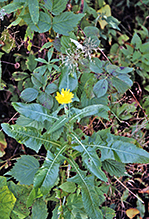 |
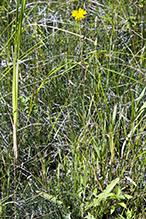 |
||||
Flower Head |
|||||
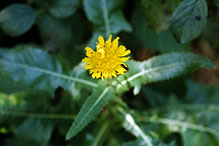 |
|||||
Leaves |
|||||
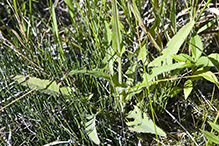 |
|||||

Slideshows |
||

Visitor Videos |
|||
Share your video of this plant. |
|||
| This button not working for you? Simply email us at info@MinnesotaSeasons.com. Attach a video, a YouTube link, or a cloud storage link. |
|||
Other Videos |
|||
| Common Sow Thistle (Sonchus Oleraceus) / Swinies - 2012-06-17 W3stlander |
|||
About
Published on Jun 18, 2012 Sonchus oleraceus (common sowthistle, sow thistle, smooth sow thistle, annual sow thistle, hare's colwort, hare's thistle, milky tassel, swinies) ------------------ |
|||
| Φαγώσιμα χόρτα-Ζοχός-Sonchus oleraceus Φτιάχνω μόνος μου |
|||
About
Published on Feb 10, 2014 Άγρια φαγώσιμα χόρτα της Ελλάδας-Ζοχός-Sonchus oleraceus Περιοχή: Αχαία, πεδινές περιοχές Μήνας: Ιανουάριος-Φεβρουάριος |
|||
| ノゲシの花 / Common sowthistle flowers blooming nobushiryodang |
|||
About
Published on May 12, 2013 2013年5月5日撮影。和歌山県橋本市下兵庫。ノゲシ(野芥子)の花。別命「ハルノノゲシ」「ケシアザミ」など。英名は"Common sowthistle"。キク科ノゲシ属の一年草。花言葉は「「旅人」「幼き友」「悠久」「見間違ってはいや」など。 |
|||

Visitor Sightings |
|||||
Report a sighting of this plant. |
|||||
| This button not working for you? Simply email us at info@MinnesotaSeasons.com. Be sure to include a location. |
|||||
|
|||||
MinnesotaSeasons.com Sightings |
|||||

|
Created: Last Updated: © MinnesotaSeasons.com. All rights reserved. |
